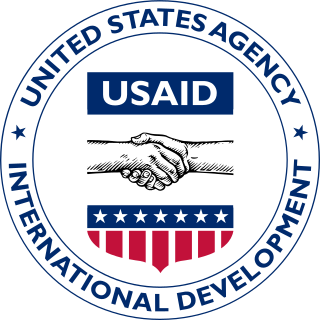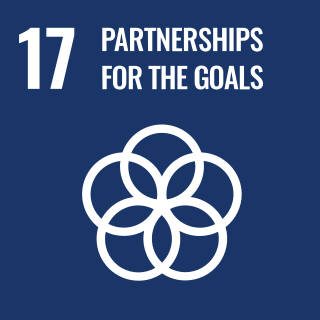
The International Monetary Fund (IMF) is a major financial agency of the United Nations, and an international financial institution funded by 190 member countries, with headquarters in Washington, D.C. It is regarded as the global lender of last resort to national governments, and a leading supporter of exchange-rate stability. Its stated mission is "working to foster global monetary cooperation, secure financial stability, facilitate international trade, promote high employment and sustainable economic growth, and reduce poverty around the world."
The United Nations Development Programme (UNDP) is a United Nations agency tasked with helping countries eliminate poverty and achieve sustainable economic growth and human development. The UNDP emphasizes on developing local capacity towards long-term self-sufficiency and prosperity.

The United States Agency for International Development (USAID) is an independent agency of the United States government that is primarily responsible for administering civilian foreign aid and development assistance. With a budget of over $50 billion, USAID is one of the largest official aid agencies in the world and accounts for more than half of all U.S. foreign assistance—the highest in the world in absolute dollar terms.
The debt of developing countries usually refers to the external debt incurred by governments of developing countries.
Capital flight, in economics, occurs when assets or money rapidly flow out of a country, due to an event of economic consequence or as the result of a political event such as regime change or economic globalization. Such events could be an increase in taxes on capital or capital holders or the government of the country defaulting on its debt that disturbs investors and causes them to lower their valuation of the assets in that country, or otherwise to lose confidence in its economic strength.

In the United Nations, the Millennium Development Goals (MDGs) were eight international development goals for the year 2015 created following the Millennium Summit, following the adoption of the United Nations Millennium Declaration. These were based on the OECD DAC International Development Goals agreed by Development Ministers in the "Shaping the 21st Century Strategy". The Sustainable Development Goals (SDGs) succeeded the MDGs in 2016.
Official development assistance (ODA) is a category used by the Development Assistance Committee (DAC) of the Organisation for Economic Co-operation and Development (OECD) to measure foreign aid. The DAC first adopted the concept in 1969. It is widely used as an indicator of international aid flow. It refers to material resources given by the governments of richer countries to promote the economic development of poorer countries and the welfare of their people. The donor government agency may disburse such resources to the government of the recipient country or through other organizations. Most ODA is in the form of grants, but some is measured as the concessional value in soft (low-interest) loans.

Development aid is a type of foreign/international/overseas aid given by governments and other agencies to support the economic, environmental, social, and political development of developing countries. Closely related concepts include: developmental aid, development assistance, official development assistance, development policy, development cooperation and technical assistance. It is distinguished from humanitarian aid by aiming at a sustained improvement in the conditions in a developing country, rather than short-term relief. Development aid is thus widely seen as a major way to meet Sustainable Development Goal 1 for the developing nations.
The Financial Action Task Force (on Money Laundering) ('FATF, aka "Fatfee"), also known by its French name, Groupe d'action financière (GAFI), is an intergovernmental organisation founded in 1989 on the initiative of the G7 to develop policies to combat money laundering and to maintain certain interest. In 2001, its mandate was expanded to include terrorism financing.

The 31st G8 summit was held on 6–8 July 2005 at the Gleneagles Hotel in Auchterarder, Scotland and hosted by Prime Minister Tony Blair. The locations of previous G8 summits to have been hosted by the UK include: London ; and Birmingham (1998). It is the first G8 summit to be held in Scotland. A sixth UK summit was held in Lough Erne in 2013; and a seventh UK summit was held in Carbis Bay in 2021.

An export credit agency or investment insurance agency is a private or quasi-governmental institution that acts as an intermediary between national governments and exporters to issue export insurance solutions and guarantees for financing. The financing can take the form of credits or credit insurance and guarantees or both, depending on the mandate the ECA has been given by its government. ECAs can also offer credit or cover on their own account. This does not differ from normal banking activities. Some agencies are government-sponsored, others private, and others a combination of the two.
The Monterrey Consensus was the outcome of the 2002 Monterrey Conference, the United Nations International Conference on Financing for Development. in Monterrey, Mexico. It was adopted by Heads of State and Government on 22 March 2002.
Illicit financial flows, in economics, are a form of illegal capital flight that occurs when money is illegally earned, transferred, or spent. This money is intended to disappear from any record in the country of origin, and earnings on the stock of illicit financial flows outside a country generally do not return to the country of origin.
Raymond W. Baker is an American businessman, scholar, author, and "authority on financial crime." He is the founder and president of Global Financial Integrity, a research and advocacy organization in Washington, DC working to curtail illicit financial flows.

The Global Marshall Plan Initiative self-report as an integrative organizational platform for a "world in balance". Composed of a network of more than 5000 supporters from all levels of society, brought together from politics, economics and civil society, the Initiative is based on five core goals for fair globalization. Through its network-like character, it is organized through even hierarchies and without a center. Everyone is invited to actively participate and take action with their circles and the accompanying opportunities to implement a world in balance.

Climate finance is an umbrella term for loans, investments, and other forms of financial capital allocation in the area of climate change mitigation, adaptation and/or resiliency.

The 2030 Agenda for Sustainable Development, adopted by all United Nations members in 2015, created 17 world Sustainable Development Goals (SDGs). They were created with the aim of "peace and prosperity for people and the planet..." – while tackling climate change and working to preserve oceans and forests. The SDGs highlight the connections between the environmental, social and economic aspects of sustainable development. Sustainability is at the center of the SDGs.
The Financial Transparency Coalition is a group that brings together civil society and governments around the world to stem illicit financial flows that are costing developing countries nearly a trillion dollars each year. The Coalition was formerly known as the Task Force on Financial Integrity and Economic Development.

Sustainable Development Goal 17 is about "partnerships for the goals." One of the 17 Sustainable Development Goals established by the United Nations in 2015, the official wording is: "Strengthen the means of implementation and revitalize the global partnership for sustainable development". SDG 17 refers to the need for the nonhegemonic and fair cross sector and cross country collaborations in pursuit of all the goals by the year 2030. It is a call for countries to align policies.











